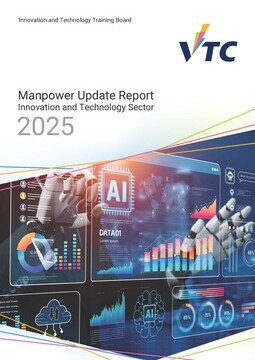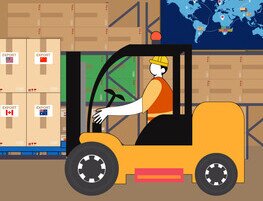How Do We Analyse Manpower Dynamics ?
VTC assesses the manpower demand for 24 major industry sectors covering more than 80% of the Hong Kong working population. The manpower dynamics of each of the 24 industries in Hong Kong is analysed through manpower survey and manpower update in a 4-year cycle. The manpower survey is a quantitative survey conducted with relevant companies once every 4 years to collect information of employees count, income, education, and so on. The manpower update is conducted twice in the 4-year cycle through focus group meeting with industry representatives and data analytics of major recruitment platforms. The information obtained from both manpower survey and manpower update aims to facilitating the Government and different stakeholders of industries for formulation of manpower and training plan.
Manpower Survey Tooltips

Companies
Enumerator
4-Year Cycle
Manpower Update Tooltips

Latest Report

- Accountancy
- 2025 Manpower Survey Report
Workforce Trends and Future Outlook in Hong Kong Accounting
Hong Kong’s accounting sector is undergoing significant transformation driven by market growth and structural change. New international standards, together with enhanced ESG and anti‑money laundering requirements, are expanding the scope and complexity of the profession, while Hong Kong’s role as a financial gateway and family office hub is increasing demand for cross‑border services. These developments are shifting accountants’ roles from traditional compliance to advisory functions, requiring new skills in data analytics, technology application, and sustainability reporting. However, talent shortages and changing career expectations present challenges. This report analyses key factors shaping the sector’s outlook and provides recommendations for the Government, employers, employees, and education institutions to strengthen talent development and support the profession’s long‑term competitiveness.

- Banking and Finance
- 2025 Manpower Survey Report
Evolving Skills and Manpower Demand in Hong Kong’s Banking and Finance Industry
Hong Kong is a leading international financial centre undergoing rapid transformation driven by digitalisation, regulatory developments and deeper integration with national strategies. This Manpower Survey Report examines evolving talent needs in the banking and financial industry, identifies emerging skills in areas such as cross‑border finance, digital assets, data analytics and financial technology, and assesses potential skills gaps. It also provides targeted recommendations for the Government, industry and education providers to support manpower planning, talent development and workforce readiness, ensuring the industry remains competitive and future‑ready.
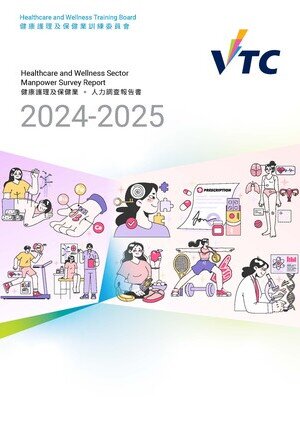
- Healthcare and Wellness
- 2024 Manpower Survey Report
The Evolving Landscape of Healthcare and Wellness in Hong Kong: Navigating Challenges and Seizing Opportunities
Hong Kong’s healthcare and wellness sector is under growing pressure as an ageing population drives higher rates of chronic diseases and increases demand on public health services. This strain is exacerbated by a persistent shortage of healthcare professionals in hospitals and by workforce ageing in settings for elderly care and rehabilitation services. Rising community stress levels, intensified by economic uncertainty, are further elevating mental health needs. Despite these challenges, significant opportunities are reshaping the sector’s future development. Government strategies are strengthening primary healthcare and shifting the system towards prevention-oriented and community-based care. Deeper collaboration within the Greater Bay Area is expanding access to cross-border healthcare services, streamlining drug approvals, and enhancing talent exchange. Rapid advancements in AI, biotechnology, and health technology improve diagnostic precision and operational efficiency, whereas gerontechnology supports ageing-in-place and enhances the elderly’s quality of life. There is a pressing need for targeted training programmes to address the talent shortages and skills gaps. Specialised training in community-based healthcare, AI applications, and soft-skills competency will be crucial for equipping professionals with the capabilities needed to thrive in this dynamic sector.

- Merchandise Trading and E-commerce
- 2024 Manpower Survey Report
Merchandise Trading and E-commerce Industry: Evolving Through Talent Development and Strategic Enhancements
The Merchandise Trading and E-commerce industry is facing significant challenges, driven by global trade tensions and rising outflow of local consumer spending due to change in consumption patterns. To address these challenges, Government should continue fundings and initiatives in supporting companies to develop E-commerce businesses and recruit talents through initiatives and regularization of Vocational Professionals Admission Scheme. Training institutions should collaborate with industry partners to offer training for emerging skills in this rapidly evolving industry. Employers and employees are encouraged to leverage various government schemes for talent development and skills enhancement.

- Innovation and Technology
- 2025 Manpower Update Report
Powering Hong Kong’s Innovation and Technology Sector: Accelerating Artificial Intelligence and Emerging Technologies to Enhance Competitiveness
In the face of rapid technological advancements, Hong Kong’s innovation and technology sector is being fortified by national strategies and robust local policy initiatives that focus on frontier technologies. This ecosystem is further propelled by research and development (R&D) platforms. Hong Kong’s roles as a “super‑connector” and “super value-adder” underlines a strategic pathway toward deeper integration of innovation and commercialisation. The talent market signals a clear imperative to embrace emerging technologies, especially in the realm of artificial intelligence. To maintain competitiveness, coordinated efforts among the Government, training institutions, employers and graduates/ employees are essential. The Government should incentivise industry-academia collaboration to accelerate the commercialisation of R&D and expand interdisciplinary STEAM pathways. Training institutions must align their curricula with both market needs and certification requirements – encompassing both Chinese Mainland and international standards – while also enhancing reskilling and upskilling initiatives. Employers should implement robust support systems to retain incoming talent, while graduates and employees should embrace lifelong learning, cultivating soft skills and an innovative mindset. This proactive strategy not only addresses immediate manpower gaps but also equips Hong Kong’s workforce for the next wave of technological transformation.

- Real Estate Services
- 2025 Manpower Update Report
Challenges of PropTech: Addressing Legal Lags and Cultivating Irreplaceable Human Skills
PropTech applications now span the entire Real Estate Services Industry but regulations have not yet fully kept pace with technological developments. To avoid legal ambiguities from impeding the adoption of the latest technology, it is hoped that the Government could establish comprehensive legal frameworks to govern PropTech applications, particularly those concerning privacy and security risks. At the same time, employees should proactively develop their soft skills – the irreplaceable human edge that will ensure their career resilience in the increasingly automated industry.
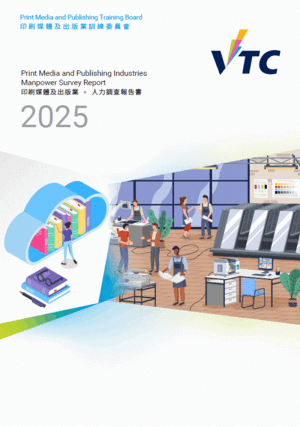
- Print Media and Publishing
- 2025 Manpower Survey Report
Driving Transformation: Emerging Opportunities and Growing Demand for Digital and Technical Talent in Print Media and Publishing Industries
Hong Kong’s print media and publishing industries are undergoing structural change, with traditional print volumes, company numbers and overall employment trending down amid digital disruption and rising costs. At the same time, rapid growth in digital printing, e‑commerce–driven packaging and new publishing formats such as e‑books, audiobooks and AI‑enabled content is creating fresh business opportunities. These shifts are sharpening demand for talent with strong digital, technical and creative skills, while an ageing workforce, notable vacancies in technical and editorial roles and difficulties in attracting younger entrants highlight the urgent need to replenish, upskill and diversify the manpower pool.
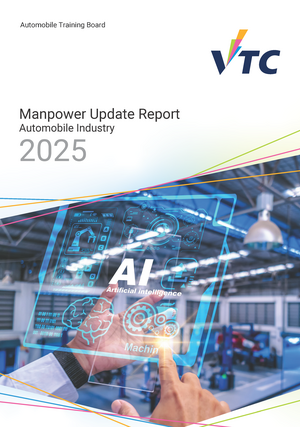
- Automobile
- 2025 Manpower Update Report
The Accelerated Shift to New Energy Vehicles
Outlined in the “Hong Kong Roadmap on Popularisation of Electric Vehicles”, the HKSAR Government’s commitment to achieving zero vehicular emissions by 2050 remains a central driver of industry transformation. By the first half of 2025, global electric vehicle (EV) sales surged, capturing over 25% of the total car market, reflecting a relentless global push towards electrification. In Hong Kong, EVs accounted for over 70% of new private car registrations, highlighting rapid local adoption. Despite this growth, the servicing sector remains dominated by internal combustion engine (ICE) vehicles, sustaining significant demand for their maintenance. For commercial vehicles, the government is advancing trials for electric taxis and hydrogen fuel cell vehicles, diversifying the new energy transport landscape. The industry's evolution now demands a workforce skilled in mechatronics, digital diagnostics, etc., underscoring the need for tailored training programmes to equip students and practitioners with the required skills.

- Maritime Services
- 2024 Manpower Survey Report
Emerging Opportunities Amid a Shifting Maritime Outlook
Employers in the maritime sector were surveyed on their expectations for the business environment over the next two years. The findings reflect a steady outlook, with some signs of optimism across the industry. A portion of respondents (3.8%) anticipated an improvement in the business climate, with 74.1% of them expecting a business volume increase of under 25%. This outlook is supported by projections of rising demand for transport and logistics services and the potential for more favourable ship acquisition costs. Meanwhile, 24.5% of respondents expected stable or moderated business activity, with 51.1% projecting a business volume adjustment of less than 25%. Factors influencing these expectations include global economic trends and evolving cost structures. Overall, the results suggest a stable business environment with opportunities for growth, particularly through enhanced demand and operational efficiencies.

- Electronics and Telecommunications
- 2024 Manpower Survey Report
Driving the Future of Innovation and Technology: The Critical Need for Skilled Professionals in Electronics and Telecommunications Industries
The optimistic outlook for Hong Kong's electronics and telecommunications sectors is driving a pressing need for skilled manpower. The rollout of 5G technology presents significant development potential for various industries and applications in smart cities, which heightens the demand for specialised talent. Moreover, the aging population is amplifying the need for health solutions, further intensifying workforce requirements in life sciences. The explosive growth of e-commerce necessitates expertise in advanced electronic systems and secure payment technologies. In response, government initiatives are strengthening talent admission schemes to attract skilled professionals, ensuring a robust workforce and reinforcing Hong Kong’s position as a technology leader.


Do You Know?
Fun Facts about the Jewellery and Timepiece Industry
“Tourbillon”– Aesthetics of Anti-Gravity
The advent of timepieces enables us to manage our time more effectively. However, do you know that the “escapement”, the regulating device in early pocket watches which controls the movement of watch hands, will be affected by gravity when it is held vertically? To address this issue, the renowned Swiss watchmaker, Abraham Louis Breguet, devised the “Tourbillon” that keeps the escapement rotating continuously to average out the gravitational effects. The “Aesthetics of Anti-Gravity” showcased by “Tourbillion” remains popular among watch enthusiasts nowadays.













